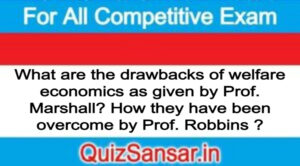
What are the drawbacks of welfare economics as given by Prof. Marshall? How they have been overcome by Prof. Robbins ?
What are the drawbacks of welfare economics as given by Prof. Marshall? How they have been overcome by Prof. Robbins ?
Ans.
Marshall, however, emphasized that economics is concerned with wealth simply by accident and its “true philosophic raison d’etre must be sought elsewhere.” Robbins, therefore, in his Essay on the Nature and Significance of Economic Science finds fault with Cannan’s enunciation of the welfare conception of economics on the following grounds:
1. Distinction between Material and Non-material Things Faulty: Robbins criticizes the distinction between material and non-material things as established by the neo-classical economists. The latter include only those activities within the scope of economics which lead to the production and consumption of material goods and services.
Robbins, however, regards all goods and services which command a price and enter into the circle of exchange as economic whether they are material or non-material. The services of teachers, lawyers, actors, etc. have each their economic aspect, because they are scarce and possess value. To say that services are non-material “is not only perverse, it is also misleading. For it is not the materiality of even material means of gratification,” says Robbins, “which gives them their status as economic goods; it is their relation to valuations. The materialist’ definition of Economic goods’; it is their relation to valuations. The materialist’ definition of Economics therefore misrepresents the science as we know it.”
2. Economics not concerned with Material Welfare: Robbins also objects to the use of the word welfare along with material. For the neo-classical economists, economics is concerned with the causes of material welfare. To Robbins, However, there are certain material activities but they do not promote welfare. For example, the manufacture and sale of wine is an economic activity but it is not conducive to human welfare. Such goods are significant from the economic point of view because they are scarce and have value.
3. Contradiction: There is a contradiction in the “non-material definition of productivity” used by Marshall. He regards the services of opera singers and dancers as productive so long as they are demanded by the people. But since they are non-material, they do not promote human welfare. As such, their services are not the subject matter of economics. Robbins, however, points out that “the services of the opera dancer are wealth. Economics deals with the pricing of their services, equally with the pricing of the services of a cook.” He therefore, concludes: “Whatever Economics is concerned with, it is not concerned with the causes of material welfare as such.”
4. Concept of Economic Welfare Vague: The idea of economic welfare is vague. Money cannot be regarded as an accurate measure of welfare, for the conception of welfare is subjective and relative. The idea of welfare varies with each individual. Wine may give pleasure to a drunkard, but it may be harmful for the novice. Again, it may be useful for people living in Siberia and Iceland but injurious for those living in hot climates. This interpersonal comparison of utility lies value judgment, which transports economics to the realm of Ethics. But Robbins has noting to do with Ethics. To him Economics is entirely neutral between ends. The ends may be noble or base, the economist is not concerned with them as such.
5. Welfare definition Classificatory and Not analytical : Robbins criticizes the material welfare definitions as being classificatory rather than analytical. These definitions deal with certain kinds of human behaviour those directed towards the procurement of material welfare. But other kinds of activities concerned with a particular aspect of human behaviour lie outside the jurisdiction of economics. Whereas the neo-classical described certain activities being “economic” and “non-economic”, Robbins finds no valid reason for making this distinction as every human activity has an economic aspect when it is undertaken under the influence of Scarcity.
6. Economics is not a Social Science but a Human Science- Robbins does not agree with Marshall that economics is a social science “a study of men as they live and move and think in the ordinary business of life” Rather he regards economics as a human science. Economics is as much concerned with an exchange economy as with a Robbins Crusoe economy. The central problem in economics, according to Robbins, is that of valuation which is one of allocation of scarce means among alternative ends. Since the generalizations of the theory of value are as applicable to the behaviour of an isolated man or the executive authority of a communist society, as to the behaviour of man in an exchange economy, therefore, economics should be regarded as a human science.
Superiority of Robbins’ Definition
Robbins’ definition is superior to the earlier definitions in more than one way.
Firstly, it does not contain such vague expressions as ‘material welfare’ and ‘material requisites of well-being’ which had made the neo-classical formulations classificatory. His definition, therefore, is analytical for “it does not attempt to pick out certain kinds of behaviour, but focuses attention on a particular aspect of behaviour, the form imposed by the influence of scarcity.”
Secondly, Robbins emphasizes that economics is a science. It is “a systematized body of knowledge which gives its proud possessor a framework within which to analyse the problems associated with the study,” Like other pure sciences, economics is neutral between ends. The ends may be noble or ignoble, material or immaterial, economic or non-economic, economics is not concerned with them as such. Economic has thus nothing to do with Ethics. For, according to Robbins ” Economics deals with ascertainable facts, Ethics with valuation and obligations. The two fields of inquiry are not on the same plane of discourse.”
Thirdly, Robbins has made economics a valuation process. Whenever the ends are unlimited and the means are scare, they give rise to an economic problem. In such a situation, there is little need for definition economics as the study of the causes of material welfare. The problems of production and distribution of wealth are also of economizing scarce resources in relating to varied ends.
Lastly, there is universality in Robbin’s scarcity definition of economics. It is as much applicable to a Robinson Crusoe economy as to a communist economy and a capitalist economy. Its laws are like the laws of life and are independent of all legal and frameworks.






